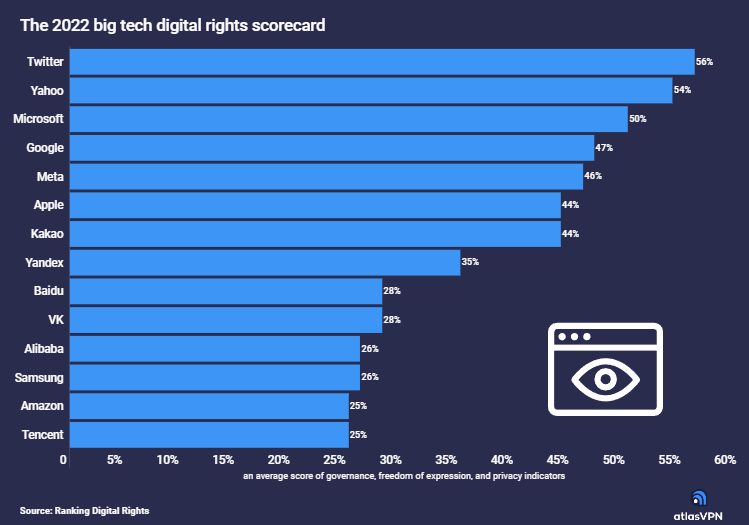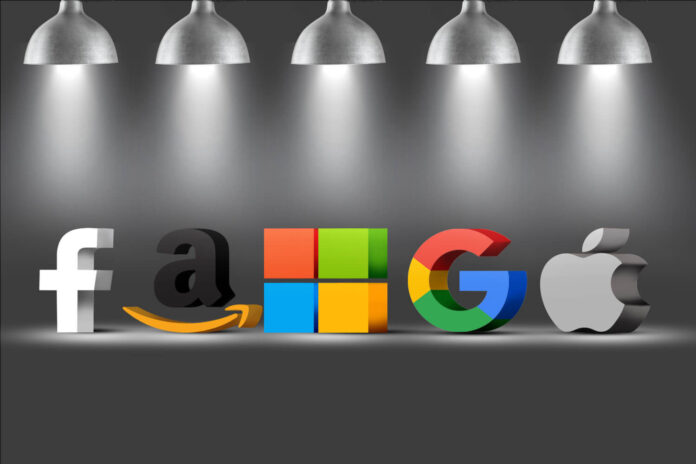Big tech companies talk a lot about privacy and freedom of expression, but their policies and practices often undermine it. Digital rights have become an integral part of basic human rights. However, tech companies often prioritize profits and growth.
According to the data provided by the Atlas VPN team, Twitter (now X) scored best on its policies and practices affecting people’s rights to freedom of expression and privacy. While Amazon and Tencent received the worst scores for their actions on people’s digital rights. However, none of the companies received a passing grade.
The data is based on statistics from the Digital Rights Rating (RDR). The organization evaluates companies on 58 indicators in three categories: governance, freedom of speech and information, and privacy.
The percentages in the chart below represent the average score of a company’s performance across all RDR indicators. Each indicator has a list of elements, and companies receive credit (full, partial or no credit) for each element they meet.

Leaders of the rating
Twitter received the best score of 56% for its practices and policies on governance, freedom of speech, and privacy. The company was ranked first for detailed content policies and public data on the moderation of user-generated content.
It is important to note that this score was calculated before Elon Musk took over Twitter. It will be interesting to see how the billionaire’s changes to the platform will affect this result in the future.
Yahoo received 54% of the digital rights score. Since its acquisition by private equity firm Apollo Global Management, Yahoo has gained almost three points due to improved security and data breach policies.
Microsoft received 50% for its digital rights practices and policies. Microsoft does not have a comprehensive policy to protect freedom of speech. Its LinkedIn platform lagged behind other social media peers on this score, failing to fully explain content removal.
Google scored 47%, but its score has been declining for the second year in a row due to outdated policies. In particular, the company’s outdated policy of notifying search users about content restrictions and the lack of encryption for Gmail and Google Drive.
Meta received 46%, despite the publication of a new human rights policy. It failed to fully protect human rights in its algorithms and did not disclose how its algorithms moderate ads.
Apple, which often boasts of its privacy commitments, scored 44%. The company’s score has increased since last year due to expanded reporting on content moderation and App Store rules. However, Apple lacks transparency in its policies and practices regarding targeted advertising.
Kakao tied with Apple to become the only non-U.S. company in the top half, with a score of 44%. It has formed a board committee to oversee privacy, freedom of expression, and other issues following the chatbot controversy.
Amazon and Tencent, on the other hand, received a terrible 25% due to significant shortcomings in policies and practices affecting digital rights. Both lack transparency regarding content moderation and compliance with government restrictions. Their failure to respect freedom of expression and privacy resulted in low scores.
Fighting the giants
As large tech companies increasingly dominate the digital environment, people face growing threats to online privacy and freedom of speech. However, there are steps that internet users can take to better protect their digital rights in an era of unprecedented Silicon Valley influence.
First and foremost, be informed. Do your research to find out how major tech companies like Google, Facebook, and Amazon are addressing critical issues like data collection, content moderation, and government requests for information.
Customizing your privacy settings is another effective tactic. Take the time to limit the amount and type of data you share on social media, e-commerce sites, and other platforms. You can review and limit app permissions, enable two-factor authentication for accounts, and in many cases, opt out of targeted advertising.
When it comes to social media and online accounts, avoid linking platforms together in a way that exposes your data to broader surveillance. Keep services isolated instead of granting permissions. Think twice before connecting Facebook to Instagram or merging your contacts.
The relentless collection of data by big tech and unsupervised algorithms threaten privacy and freedom of speech. People need to educate themselves, minimize data sharing, and use privacy tools to take more control of their digital rights into their own hands.









